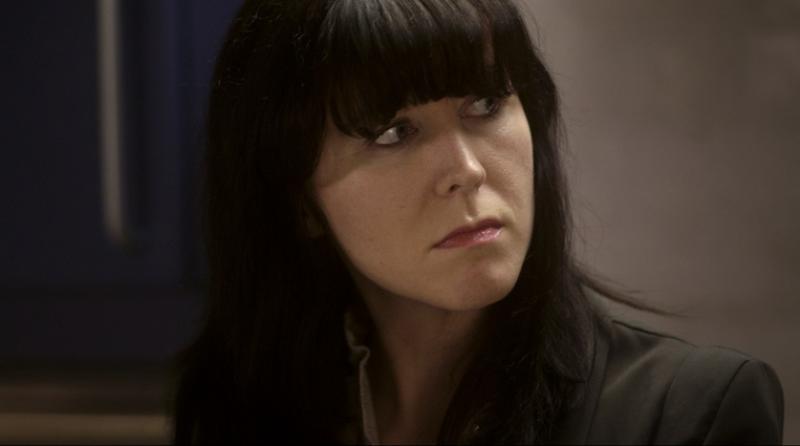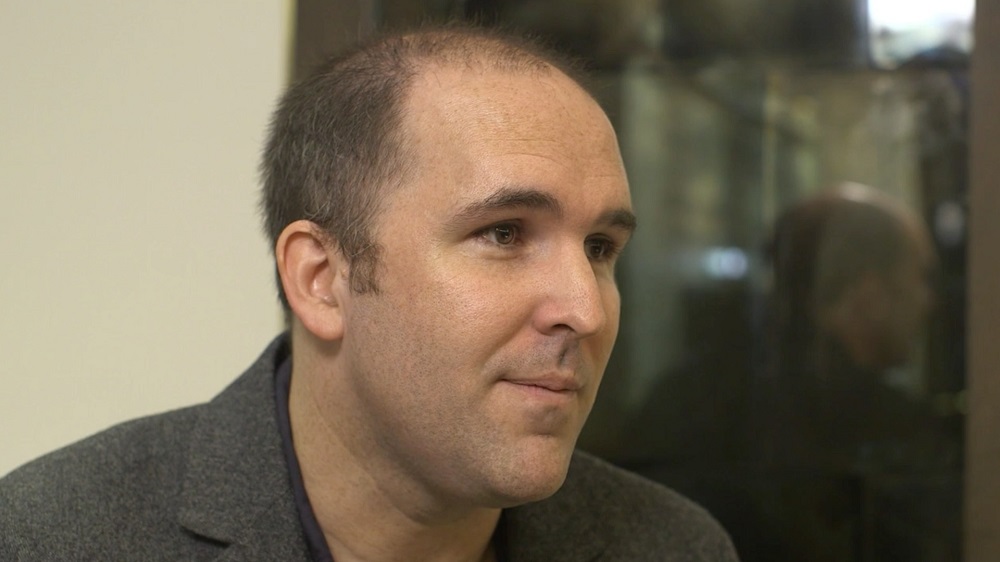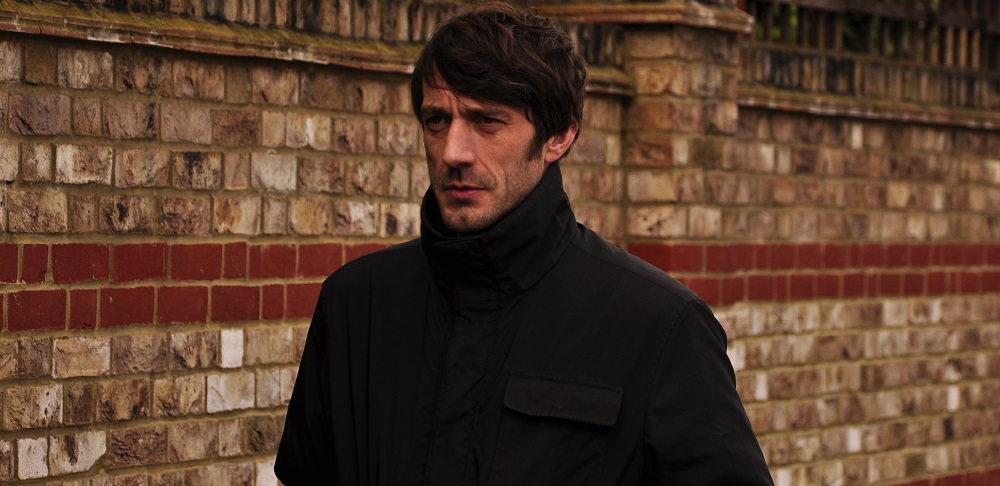'It was appealing to make a thriller about mental illness': Gareth Tunley and Alice Lowe on 'The Ghoul' | reviews, news & interviews
'It was appealing to make a thriller about mental illness': Gareth Tunley and Alice Lowe on 'The Ghoul'
'It was appealing to make a thriller about mental illness': Gareth Tunley and Alice Lowe on 'The Ghoul'
The director and one of the stars on The Ghoul and low-budget British movies

Gareth Tunley, director of the psychological drama The Ghoul, and Alice Lowe, one of its stars, are a duo with eclectic tastes. They share a background in comedy, but cite everything from punk to surrealism and the occult as influences on Tunley’s directorial debut, which was produced by Ben Wheatley.
Genre nods, mental illness, the underlying suggestion of magic and an unreliable protagonist set the tone of the film, which follows the life of a detective who goes into therapy to try to uncover the secret of a seemingly impossible double murder, before revelations begin to suggest his life may not be as straightforward as it seems.
As an actor Tunley has appeared in Wheatley’s Sightseers, Kill List and Down Terrace, as well as making numerous appearances in TV comedy. Lowe most recently wrote, directed and starred in the comedy slasher film Prevenge. Lowe and Tunley and a significant proportion of the film’s cast have collaborated before, and theartsdesk began by asking the pair about the collective creative effort.
THOMAS BARRIE: Tell me about the collaborative process during filming – you both have acting, directing and writing credits on previous projects, so how much input was there from the cast during production?
 GARETH TUNLEY (pictured right): We were on quite a constrained schedule, because we were on such a tiny budget, so this is not a film where there is loads of improvisation, but there was lots of input from the cast. We rehearsed before quite extensively; I rehearsed with the lead actor and producer Tom Meeten (pictured below), so he knew his character and by the time we came to rehearse [Alice’s] scenes, it was kind of focussed on discussing your character, wasn’t it?
GARETH TUNLEY (pictured right): We were on quite a constrained schedule, because we were on such a tiny budget, so this is not a film where there is loads of improvisation, but there was lots of input from the cast. We rehearsed before quite extensively; I rehearsed with the lead actor and producer Tom Meeten (pictured below), so he knew his character and by the time we came to rehearse [Alice’s] scenes, it was kind of focussed on discussing your character, wasn’t it?
ALICE LOWE: It’s quite interesting because Tom’s a producer – the lead’s not generally a producer unless it’s Russell Crowe’s pet project, or something like that, that he’s brought to the screen. The way that we’ve worked over the years is almost a collective. We’ve been working together in comedy for such a long time, you can pick up the phone and say, “Oh, can you come in and do this acting role for me?” Gareth’s actually going to be script-editing on my next film, for want of a better word; it sounds like a demotion but it’s not…
GT: It’s a promotion. I’ll take it!
AL: That’s what’s good about the way we work together. It’s like a communistic society we’ve formed around film.
GT: We’re basically creating some sort of utopian anarchist collective by accident, by making low-budget films.

GT: It was always a psychological thriller, but I’m really pleased that we had a cast that was – in the nicest possible way – a bunch of clowns, who bring a lightness to quite a dark film, as well as an interesting texture to the performances. Because comedians have been on stage and faced down a room full of baying drunks in the Purple Turtle on the Essex Road, there’s a kind of fearlessness that they have, so when you point a camera at them and put them under the pressure of a tight schedule and a set, they just have a certain hold-their-ground kind of courage.
AL: I remember you saying to me, when you were directing it, “We can’t veer into parody.” You were absolutely right. When you’re already dealing with shifting between two different tones, to add loads of comedy into that, you don’t want people to suddenly stop taking it seriously and go “I’ve been snapped completely out of this now, I can’t take it seriously any more.” Then you’re watching bloomin’ Tropic Thunder or Anchorman. So it’s a dangerous thing to add into the mix, going further with comedy. I think the thing is, the comedy comes when you don’t know it. When you’re making something that’s a bit thrilling and a bit scary, sometimes the laughs come and you weren’t expecting it.
GT: Having a low budget meant that if I’d had millions of pounds, I might have been tempted to push the more genre elements into more stylised space, but luckily we had no money! It meant that the whole film – broadly speaking – has to look like it’s in the same world, and so the main character’s fantasies seem to be constructed from the more or less mundane fabric of everyday life.
There are some references to magic and the occult in the film, but there’s also the very serious underlying subject of mental health. Were you initially aware of the slightly fantastical nature of certain aspects of the film, alongside the serious themes?
GT: While coming up with ideas it became apparent that it was a film about depression and mental illness. It was really appealing to wrap it up in genre clothing and make, essentially, a thriller and a detective story, but about mental health. I think that’s one of the reasons why the detective story, as a form, has lasted for a century or more: you can explore all these different themes, whether they’re social themes or philosophical themes. There are things about mental health which are real taboos, such as people with mental health issues having to pretend to be well. The detective story turned out to be a great way to explore these rather thorny and unpleasant themes in an entertaining way.
AL: You can sort of watch it and choose. That’s what I like about it. You can choose to believe that the character’s mad, or you can choose to believe in the witchcraft element of it, which is a nice metaphysical little conundrum. It’s very Alan Moore, that aspect of it.
Surrealism and the occult feature heavily in producer Ben Wheatley’s own work. What was his influence on the film?
GT: His influence was more in making film on a small scale. Ben Wheatley and his team were a huge influence in showing that you could just go and make a film. I was in a film of his called Down Terrace, a few years ago. I just remember being impressed by their whole attitude, their whole ethos. They were timing how long it took to film scenes, because they only had 45 minutes to do a scene, not half a day. You can’t go five minutes over, otherwise you’re going to lose a scene later in the day. It was that discipline on one hand, and this anarchic punk spirit, wedded together, that produced Down Terrace and led to all these other amazing films with bigger budgets but the same kind of ethos. I think every few years there’s a sort of trailblazer, and I think in terms of low-budget filmmaking Ben Wheatley was the man for that.
AL: From my perspective, the experience I’ve gathered has suddenly got to a point where it’s crossing over with what ideas I’ve had, and I have the power to implement those ideas and get them made. It has taken a long time. Certainly what I do – I don’t think it’s consciously – is mixing a lot of different very British ideas with kind of a punk ethos, a surrealist ethos mixed in with naturalism, and then maybe a weird sort of pagan, witchcrafty thing. Or maybe it’s not even witchcraft, but I think that’s what’s so interesting about The Ghoul. It’s someone haunted by themselves. And I think that’s a very “MR James” tradition of spookiness. When you mix all those things it’s a potent mix.
GT: I think there’s also a generational thing happening, perhaps, in that we’re all roughly the same vintage.
AL: We’re probably all a bit obsessed with the past as well. The Seventies.
GT: Yeah, we all grew up when Hammer Horror films were on on a rainy Bank Holiday.
AL: When kids’ shows were weird.
GT: Kids’ shows were really, really disturbing – Ben and I both read 2000AD as kids, so there’s lots of the same influences, half-remembered, half-forgotten, feeding into this stuff.
- The Ghoul is in cinemas now
- More film on theartsdesk
Explore topics
Share this article
The future of Arts Journalism
You can stop theartsdesk.com closing!
We urgently need financing to survive. Our fundraising drive has thus far raised £49,000 but we need to reach £100,000 or we will be forced to close. Please contribute here: https://gofund.me/c3f6033d
And if you can forward this information to anyone who might assist, we’d be grateful.

Subscribe to theartsdesk.com
Thank you for continuing to read our work on theartsdesk.com. For unlimited access to every article in its entirety, including our archive of more than 15,000 pieces, we're asking for £5 per month or £40 per year. We feel it's a very good deal, and hope you do too.
To take a subscription now simply click here.
And if you're looking for that extra gift for a friend or family member, why not treat them to a theartsdesk.com gift subscription?
more Film
 A House of Dynamite review - the final countdown
Kathryn Bigelow's cautionary tale sets the nuclear clock ticking again
A House of Dynamite review - the final countdown
Kathryn Bigelow's cautionary tale sets the nuclear clock ticking again
 theartsdesk Q&A: Idris Elba on playing a US President faced with a missile crisis in 'A House of Dynamite'
The star talks about Presidential decision-making when millions of lives are imperilled
theartsdesk Q&A: Idris Elba on playing a US President faced with a missile crisis in 'A House of Dynamite'
The star talks about Presidential decision-making when millions of lives are imperilled
 Urchin review - superb homeless drama
Frank Dillane gives a star-making turn in Harris Dickinson’s impressive directorial debut
Urchin review - superb homeless drama
Frank Dillane gives a star-making turn in Harris Dickinson’s impressive directorial debut
 Mr Blake at Your Service review - John Malkovich in unlikely role as an English butler
Weird comedy directed by novelist Gilles Legardinier
Mr Blake at Your Service review - John Malkovich in unlikely role as an English butler
Weird comedy directed by novelist Gilles Legardinier
 Don't Let's Go to the Dogs Tonight review - vivid adaptation of a memoir about a Rhodesian childhood
Embeth Davidtz delivers an impressive directing debut and an exceptional child star
Don't Let's Go to the Dogs Tonight review - vivid adaptation of a memoir about a Rhodesian childhood
Embeth Davidtz delivers an impressive directing debut and an exceptional child star
 One Battle After Another review - Paul Thomas Anderson satirises America's culture wars
Leonardo DiCaprio, Teyana Taylor, and Sean Penn star in a rollercoasting political thriller
One Battle After Another review - Paul Thomas Anderson satirises America's culture wars
Leonardo DiCaprio, Teyana Taylor, and Sean Penn star in a rollercoasting political thriller
 Steve review - educator in crisis
Cillian Murphy excels as a troubled headmaster working with delinquent boys
Steve review - educator in crisis
Cillian Murphy excels as a troubled headmaster working with delinquent boys
 Can I get a Witness? review - time to die before you get old
Ann Marie Fleming directs Sandra Oh in dystopian fantasy that fails to ignite
Can I get a Witness? review - time to die before you get old
Ann Marie Fleming directs Sandra Oh in dystopian fantasy that fails to ignite
 Happyend review - the kids are never alright
In this futuristic blackboard jungle everything is a bit too manicured
Happyend review - the kids are never alright
In this futuristic blackboard jungle everything is a bit too manicured
 Robert Redford (1936-2025)
The star was more admired within the screen trade than by the critics
Robert Redford (1936-2025)
The star was more admired within the screen trade than by the critics

Add comment